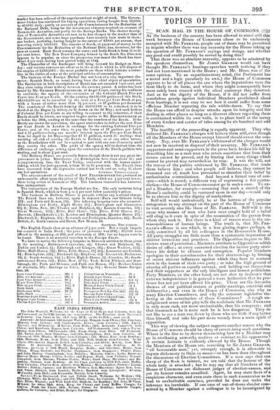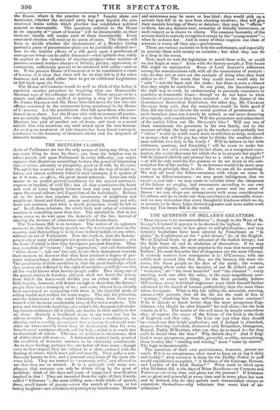TOPICS OF THE DAY.
SCAN. MAG. IN THE HOUSE OF, COMMONS. c'v-EAtil As thebusiness of the country has been allowed to stand still this SCAN. MAG. IN THE HOUSE OF, COMMONS. c'v-EAtil As thebusiness of the country has been allowed to stand still this
week because the House of Commons chose to be exclusively occupied with Mr. FERRAED, people out of doors may be permitted to inquire whether there was any necessity for the House taking up the question of Mr. FERRAND'S sayings and doings, and whether any good end could possibly be served by doing this?
That there was no absolute necessity, appears to be admitted by the speakers themselves. Sir JAMES GRAHAM would not have thought Mr. FERRAND'S hustings-speeches worth noticing if they had not been mentioned in the House ; and Mr. HonG was of the same opinion. To an unparliamentary mind, (for Parliament has a moral and a logic peculiarly its own) the House of Commons appears to be of all places the one where the imputations were the least likely to do harm, and where they might consequently have most safely been treated with the silent contempt they deserved.
And as for the dignity of the House, if it did not suffer from scandalous gossip against individual Members proclaimed aloud from hustings, it is not easy to see how it could suffer from some officious Member repeating the tale within-doors. To say that the House can afford to despise attacks upon its integrity and fair
dealing in other places so long as a discreet silence regarding them is entertained within its (van walls, is to place itself at the mercy of every fetcher and carrier of tales among its six hundred and odd Members.
The inutility of the proceeding is equally apparent. They who believed Mr. TERRA/113'S charges will believe them still, even though all the Members of the House except himself should swear the con, trary. Nay, even Mr. FRIIRAND'S withdrawal of the charges would not now be received as disproof of their accuracy. Mr. FERRAND'S supporters and semi-supporters in the press have broken his fall by describing him as a rash man who utters assertions that from them nature cannot be proved, and by hinting that many things which cannot be proved may nevertheless be true. It was the will, not
the reason of the parties addressed by Mr. TERRA/in, that made them believe him ; and what people will believe, they cannot be
reasoned out of, much less persuaded to abandon their belief by authoritative contradictions. And beyond a formal vote of cen- sure—which is merely a different way of expressing a flat contra- diction—the House of Commons cannot go in such a case. To ex, pel a Member, for example—assuming that such a stretch of the House's authority could be ventured upon in our day—would only be to elevate him to the dignity of martyrdom. Self-will would undoubtedly be at the bottom of the popular antagonism to any attempt on the part of the House of Commons to visit severely sins like those of Mr. FERRAND. Self-will is the cause why masses of men who have once caught hold of a belief will cling to it even in spite of the recantation of the person from
whom they took it. But there is a kind of reason even in the un-
reasonableness of human beings. The truth is, that Mr. Fine- Rasp's offence is one which, in a less glaring degree perhaps, is daily committed by all his colleagues in the Honourable House. All party-struggles are little more than a systematic imputation of sinister intentions and practices. The Opposition impute to Mi- nisters want of patriotism ; Ministers attribute to Opposition selfish desire of office; at every contested election the beaten party attri- butes his defeat to chicane and corruption. Popular Members apologize to their constituencies for their shortcomings by hinting at secret sinister influences against which they have to contend even in the bosom of their own party ; or take the high ground of abusing all parties as equally corrupt, and holding out themselves and their supporters as the only intelligent and honest politicians. Party Members, on the other hand, are not slow to insinuate that extreme independence is in general a mere intimation that its pro- fessor has not 3 et been offered his price. These are the favourite themes of our political orators at public meetings, convivial and deliberative ; and even in the House of Commons, else why so many Election Committees, and why the constant legislative tin- kering at the constitution of those Committees? A rough un- enlightened sense of fair play tells the multitude that Mr. FERRAN]) is only more rash, not more uncharitable, than his compeers ; and that inasmuch as he is more rash he is less dangerous. They do
not like to see a man run down by those who are little if any better than himself, and take his part more warmly from a mere spirit of opposition.
This way of viewing the subject suggests another reason why the House of Commons should be chary of entertaining such questions.
Where is the line to be drawn determining how far a Member may go in attributing unworthy motives or conduct to his opponents ? A certain latitude is evidently allowed by the House. Though the Members of the House are, according to Sir Jastss GRAHAM, "all honourable men," yet, strangely enough, it is allowable to impute dishonesty to them en masse—as has been done throughout the discussions on Election Committees. If a man says that one sheep of the flock is tainted, we are told that the honour of the whole body is attacked ' • but be may say that all Members of the House of Commons are dishonest judges of election-causes, and yet its honour remains unsullied. Again, he may state facts of a suspicious character, and even state them in such a connexion as to lead to uncharitable surmises, provided he does not make the inference too inevitable. If one case of out-of-doors slander coin-. mitted by a Member against a colleague is to be investigated by. the House, where is the practice to stop ? Inquiry alone can determine, whether the accused party has gone beyond the con- ventional limits within which practice has established political scandal as warrantable. The questions referred to the House in its capacity of" court of honour" will be innumerable, as their intricate details will render each of them interminable. Every contested election will send up its quota of cases. The House will have to decide whether the circumstance of a Member having pawned a piece of presentation-plate can be justifiably alluded to— how far the lenitive effects of a silk gown upon a gentleman of outrageous virtue can be safely discussed—what epithets may safely be applied to the violation of election-pledges—what number of persons accused renders charges of bribery, perjury, oppression, or corruption, sufficiently general to be advanced with safety—and so On. It' the present House of Commons is to be constituted a court of honour, it is clear that there will be no time left to it for other business, and we shall either have to get an additional Legislature or fell back upon the Peers. The House of Commons would do well to think of this before it establish another precedent by inquiring what one Honourable Member says of his colleague out of doors. There appears to be a simple and efficacious method of putting a stop to the practice. Sir JAMES GRAHAM and Mr. Hoen have laid down the law that the offence consisted in the statements being mentioned in the House of Ct mmons. Let the punishment then fall upon those who men- tioned them there. Let the House visit with its censure all parties, not personally implicated, who take upon them to tell it what one Member has said of another out of doors, and treat as a moral suicide him who mentions any such attack upon his own honour. An analogous treatment of tale-bearers has been found extremely conducive to the harmony of domestic circles and the despatch of domestic business.



























 Previous page
Previous page